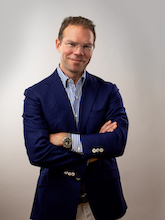















September 12, 2022 | permalink
Nearly a decade ago, as geopolitical competition, economic dislocation, technological disruption, and climate change began their breakneck acceleration, my friend Parag Khanna and I wrote an essay for Reuters asking, “Where will you live in 2050?” Assessing risks around the globe, we took a stab at identifying the regions most likely to adapt to mounting complexity through a combination of good governance and climate resilient. (The punchline: Parag promptly moved to Singapore, opting for governance. I later chose Montréal, prioritizing the opposite side of our equation.)
Not content to spitball ideas in op-eds, Parag took our musings a step further — recruiting some of the most talented minds in climate science and software engineering, he built an analytics platform combining climate models, real estate valuations, and socio-economic trends. The result is a forecasting tool expressly designed to steer investment toward the (currently undervalued) resilient regions of tomorrow. Meet Climate Alpha.
I’m delighted to join the company — which officially launches today — as its chief communications officer, helping to tell our story. Follow us on LinkedIn for regular updates, or drop by our News page for press mentions and Insights for analysis of our own. More to come.

» Folllow me on Twitter.
» Email me.
» See upcoming events.

Greg Lindsay is a generalist, urbanist, futurist, and speaker. He is a non-resident senior fellow of the Arizona State University Threatcasting Lab, a non-resident senior fellow of MIT’s Future Urban Collectives Lab, and a non-resident senior fellow of the Atlantic Council’s Scowcroft Strategy Initiative. He was the founding chief communications officer of Climate Alpha and remains a senior advisor. Previously, he was an urban tech fellow at Cornell Tech’s Jacobs Institute, where he explored the implications of AI and augmented reality at urban scale.

January 31, 2024
Unfrozen: Domo Arigatou, “Mike 2.0”
January 22, 2024
The Future of Generative AI in Architecture, Engineering, and Construction
January 18, 2024
The Promise and Perils of the Augmented City
January 13, 2024
Henley & Partners: Generative AI, Human Labor, and Mobility

----- | January 22, 2024
The Future of Generative AI in Architecture, Engineering, and Construction
----- | January 1, 2024
----- | August 3, 2023
CityLab | June 12, 2023
Augmented Reality Is Coming for Cities
CityLab | April 25, 2023
The Line Is Blurring Between Remote Workers and Tourists
CityLab | December 7, 2021
The Dark Side of 15-Minute Grocery Delivery
Fast Company | June 2021
Why the Great Lakes need to be the center of our climate strategy
Fast Company | March 2020
How to design a smart city that’s built on empowerment–not corporate surveillance
URBAN-X | December 2019
CityLab | December 10, 2018
The State of Play: Connected Mobility in San Francisco, Boston, and Detroit
Harvard Business Review | September 24, 2018
Why Companies Are Creating Their Own Coworking Spaces
CityLab | July 2018
The State of Play: Connected Mobility + U.S. Cities
Medium | May 1, 2017
Fast Company | January 19, 2017
The Collaboration Software That’s Rejuvenating The Young Global Leaders Of Davos
The Guardian | January 13, 2017
What If Uber Kills Public Transport Instead of Cars
Backchannel | January 4, 2017
The Office of the Future Is… an Office
New Cities Foundation | October 2016
Now Arriving: A Connected Mobility Roadmap for Public Transport
Inc. | October 2016
Why Every Business Should Start in a Co-Working Space
Popular Mechanics | May 11, 2016
Can the World’s Worst Traffic Problem Be Solved?
The New Republic | January/February 2016